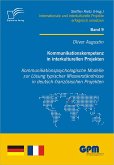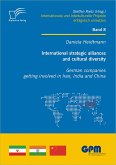This book engages in a critical reading of cultural knowledge. By cultural knowledge I refer to cultural dimensions as introduced by Geert Hofstede, Edward T. Hall and Fons Trompenaars. Their research has manifold been taught to individuals who will face an intercultural setting in their business career at some point in the future. It aims to create understanding for cultural differences in order to decrease emotional discomfort and enhance (business) success of those who acquire the knowledge. At the same time it claims to present a foundation for respect for cultural differences since it gives (an imaginative) room to them. If one studies the knowledge (s)he will be aware of cultural differences and therefore treat them with respect. The book is composed of two perspectives on cultural knowledge. In a first step the book turns to post-colonial theory. Post-colonialism argues how a Western perspective has framed cultural identities and how these representations are flawed by colonial thinking. In a second step a Levinasian perspective is taken on cultural knowledge. The French philosopher Emmanuel Levinas was deeply concerned with our way of approaching the Other. He understood the Other to be incomprehensible to our understanding. The Other's otherness cannot be "grasped" by framing her/him into categories. He argued that every encounter is of ethical nature and encouraged each individual to show infinite re-sponsibility (responsebility) towards the Other that is not confined by any pre-knowledge. The book concludes that cultural knowledge has been exposed to significant limitations. These limitations are mainly a product of control interests. Individuals who acquire cultural knowledge and are not (made) aware of its limitations face consequences that may compromise their respect for cultural differences. Even though cultural knowledge presents itself as foundation for respect, it prioritizes understanding for the sake of control. As a consequence respectful representations are not given and respect for cultural differences is only supported as long as it does not threaten control. Ultimately, this book shall present a plea for trainers and teachers of cultural knowledge to become acquainted with the limitations, reflect on them and forward this knowledge to their students. It shall also encourage researchers of cultural differences and other scholars to reflect and perhaps improve on it.
Dieser Download kann aus rechtlichen Gründen nur mit Rechnungsadresse in A, B, BG, CY, CZ, D, DK, EW, E, FIN, F, GR, HR, H, IRL, I, LT, L, LR, M, NL, PL, P, R, S, SLO, SK ausgeliefert werden.









